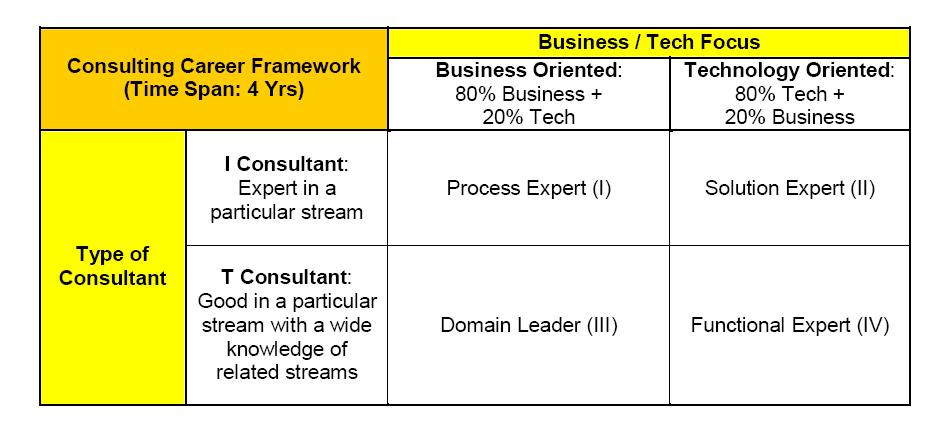
The Consulting Career Framework is built with the time span of (3-5) 4 years.
The framework considers two broad parameters
A. Types of Consultants: I or T type.
B. Business or Technological Focus
A. Types of Consultants:
Consultants can be broadly classified into two types; namely, I type and T type.
‘I Consultants’ are professionals who achieve very high level of expertise in a particular stream. This can be a particular industry, service line or technology.
An example of this could be a banking processes/law expert or a java or dot-net technology expert.
‘T Consultants’ are professionals who have good knowledge and understanding about a particular stream but also have valuable exposure/knowledge to related streams. These are people who have in-depth understanding of their area of specialization with good understanding of the related business environment which includes customers, suppliers, competitors or even similar function in a different industry/ market.
B. Business & Technological Focus
In the modern day world business and technology are finely intertwined in each other. Business needs technological support to function and technology must be viable and adaptable to varying business models.
The matrix classifies consultants as:
1. Business oriented (80% business & 20% technology): These are functional consultants who focus on numerous core operational processes on an organization. Their objective is to understand and capture business requirements and achieve enable process execution by making best use of available technology.
2. Technology oriented (80% Technology & 20% business): These are I.T. consultants who have deep understanding of technologies with respect to solution designs and its functionalities.
The careers profiles from the framework are as defined below:
1. Process Experts: These are consultants with a deep understanding of the business domain. They are completely aware of the requirements, challenges and technology available for that particular domain. They are most capable of designing processes complying to the principles of the domain with the desired
output.
2. Solution Experts: These are consultants who have thorough knowledge about a specific technology/solution. They are well versed with the technological capabilities and limitation of the technology/ solution and play advisory role in customizing the technology/solution to the business requirements.
3. Domain Leaders: These are consultants who have developed thorough knowledge of a particular industry/function and have good understanding of the related industry functions. There people usually emerge as business leaders who are able to innovate, copy best practices and take a holistic/360 degree view of the complete situation.
4. Functional Experts: There are consultants with good understanding of technologies. They are best translators of business requirements to technical requirements and assess technological/solution feasibility to the business needs.
Combining the power of FOUR.
A successful business requires professionals of every domain. It is lead by the Domain Leader (III) who is a visionary. With deep understanding of his business and broad understanding of its environment he is able to envision new goals and challenges. DL relies on the Process Expert (I) to design the business/operation/ process model to convert the vision into reality. Based on the business/ operation/ process design the Functional Expert (IV) captures business requirements and translates them into functional requirements. FE explores and assesses various technologies/ solutions suitable to the requirements. FE shares these requirements with Solution Experts (II) who assess, customize and enhance capability of their technology/ solution to the business.